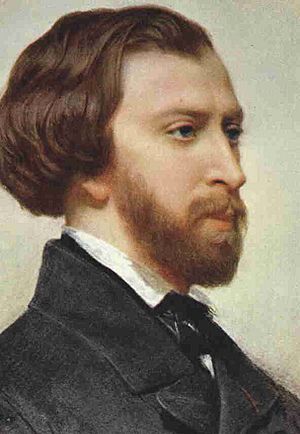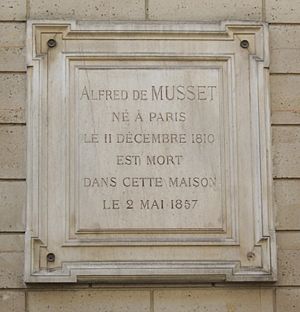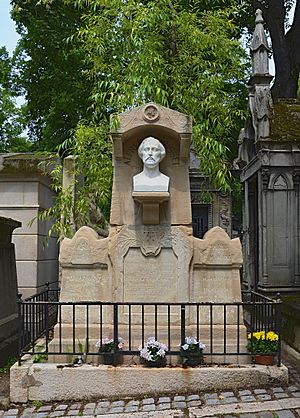Alfred de Musset facts for kids
Quick facts for kids
Alfred de Musset
|
|
|---|---|

Musset painted by Charles Landelle
|
|
| Born | Alfred Louis Charles de Musset-Pathay 11 December 1810 Paris, France |
| Died | 2 May 1857 (aged 46) Paris, France |
| Occupation | Poet, dramatist |
| Literary movement | Romanticism |
| Signature | |
 |
|
Alfred Louis Charles de Musset-Pathay (born December 11, 1810 – died May 2, 1857) was a famous French writer. He was a talented dramatist (playwright), poet, and novelist. He is well-known for his poems and for writing an autobiographical novel called La Confession d'un enfant du siècle (which means The Confession of a Child of the Century).
Contents
About Alfred de Musset's Life
Alfred de Musset was born in Paris, France. His family was from a high social class but did not have much money. His father worked in important government jobs. Alfred's mother often hosted parties and dinners at their home, which left a big impression on young Alfred.
Even as a boy, Alfred showed his creative talents. He loved to act out small plays based on old romance stories he had read. Years later, his older brother, Paul de Musset, wrote a book about Alfred's life, sharing many of these early details.
Alfred de Musset started school at the lycée Henri-IV when he was nine years old. In 1827, at age 17, he won a prize for a Latin essay in a big competition called the Concours général. With help from Paul Foucher, who was related to the famous writer Victor Hugo, Alfred began attending a literary group called the Cénacle. This group met at the Bibliothèque de l'Arsenal and was led by Charles Nodier.
Alfred tried different career paths, including medicine, law, drawing, and music. However, he found his true calling in writing. He became one of the first writers of the Romantic movement. His first collection of poems, Contes d'Espagne et d'Italie (Tales of Spain and Italy), was published in 1829. By the time he was 20, he was already famous for his writing and known for his stylish and sometimes wild lifestyle.
Working for the Government
Musset worked as a librarian for the French government during a time known as the July Monarchy. He held liberal political views and was on good terms with the family of King Louis Philippe.
He also got involved in a political debate in 1840, known as the Rhine crisis. This happened when the French prime minister, Adolphe Thiers, wanted France to control the land on the left bank of the Rhine river, claiming it was France's "natural boundary." This land had many German people living there. German writers and poets responded with songs and poems, saying France should not have their land. Musset wrote his own poem in response, called "Nous l'avons eu, votre Rhin allemand" (We've had it, your German Rhine).
His Famous Love Story
From 1833 to 1835, Musset had a well-known relationship with the writer George Sand. He wrote about this experience from his side in his autobiographical novel La Confession d'un Enfant du Siècle (1836). This book was later made into two films: Children of the Century (1999) and Confession of a Child of the Century (2012). George Sand also wrote about their relationship from her point of view in her book Elle et lui (1859). Musset's series of poems called Nuits (Nights) (1835–1837) describes his feelings about his love for Sand, from deep sadness to finally accepting things.
After a revolution in 1848, Musset lost his job as a librarian. However, he was appointed librarian of the Ministry of Public Instruction in 1853, which was another government job.
In 1845, Musset received a special honor called the Légion d'honneur, at the same time as another famous writer, Honoré de Balzac. In 1852, after two earlier attempts, he was elected to the Académie Française, a very important French institution that protects the French language.
Alfred de Musset passed away in his sleep in Paris in 1857 due to heart failure. He was buried in the famous Père Lachaise Cemetery in Paris.
Musset's Influence on Music
Many composers, especially French ones, used Alfred de Musset's poetry and plays to create their musical works in the 19th and early 20th centuries.
For example:
- Georges Bizet's opera Djamileh (1871) is based on Musset's story Namouna.
- In 1872, Jacques Offenbach created an opéra comique (a type of opera with spoken dialogue) called Fantasio. It was based on Musset's play of the same name.
- The play La Coupe et les lèvres was used for Giacomo Puccini's opera Edgar (1889).
- Fortunio, an opera by André Messager, is based on Musset's comedy Le Chandelier.
- Les caprices de Marianne, an opera by Henri Sauguet (1954), is also based on a play by Musset.
- The opera Andrea del Sarto (1968) by Daniel-Lesur was based on Musset's play André del Sarto.
- The play Lorenzaccio was set to music by Sylvano Bussotti in 1972.
Musset's poems were also turned into songs:
- Bizet set Musset's poems "À une fleur" and "Adieux à Suzon" for voice and piano.
- Pauline Viardot set "Madrid" for voice and piano.
- The Welsh composer Morfydd Llwyn Owen wrote songs for "La Tristesse" and "Chanson de Fortunio".
- Lili Boulanger's Pour les funérailles d'un soldat uses lines from Musset's play La Coupe et les lèvres.
Other musical works inspired by Musset include:
- Ruggero Leoncavallo's symphonic poem La Nuit de Mai (1886) was based on Musset's poetry.
- Mario Castelnuovo-Tedesco's piano piece Cielo di settembre (1910) gets its name from a line in Musset's poem "A quoi rêvent les jeunes filles".
- Rebecca Clarke's Viola Sonata (1919) starts with two lines from Musset's La Nuit de Mai.
In 2007, the singer Céline Dion recorded a song called "Lettre de George Sand à Alfred de Musset" for her album D'elles.
Famous Sayings
- "How glorious it is – and also how painful – to be an exception."
- "Man is a pupil, pain is his teacher."
Alfred de Musset's Works
Poetry Collections
- À Mademoiselle Zoé le Douairin (1826)
- Un rêve (1828)
- Contes d'Espagne et d'Italie (1830)
- La Quittance du diable (1830)
- La Coupe et les lèvres (1831)
- Namouna (1831)
- Rolla (1833)
- Perdican (1834)
- Camille et Rosette (1834)
- L'Espoir en Dieu (1838)
- La Nuit de mai (1835)
- La Nuit de décembre (1835)
- La Nuit d'août (1836)
- La Nuit d'octobre (1837)
- La Nuit d'avril (1838)
- Chanson de Barberine (1836)
- À la Malibran (1837)
- Tristesse (1840)
- Une Soirée perdue (1840)
- Souvenir (1841)
- Le Voyage où il vous plaira (1842)
- Sur la paresse (1842)
- Après une lecture (1842)
- Les Filles de Loth (1849)
- Carmosine (1850)
- Bettine (1851)
- Faustine (1851)
- Œuvres posthumes (1860)
Plays (Dramas)
- La Quittance du diable (1830)
- La Nuit vénitienne (1830)
- This play was not successful when first performed. For many years after this, his plays were published but not acted on stage until 1847.
- La Coupe et les lèvres (1831)
- À quoi rêvent les jeunes filles (1832)
- André del Sarto (1833)
- Les Caprices de Marianne (1833)
- Lorenzaccio (1833)
- Fantasio (1834)
- On ne badine pas avec l'amour (1834)
- La Quenouille de Barberine (1835)
- Le Chandelier (1835)
- Il ne faut jurer de rien (1836)
- Faire sans dire (1836)
- Un Caprice (1837)
- This play was first performed in 1847 and was a huge success, which then led to other plays being performed.
- Il faut qu'une porte soit ouverte ou fermée (1845)
- L'Habit vert (1849)
- Louison (1849)
- On ne saurait penser à tout (1849)
- L'Âne et le Ruisseau (1855)
Novels
- La Confession d'un enfant du siècle (The Confession of a Child of the Century, 1836)
- Histoire d'un merle blanc (The White Blackbird, 1842)
Short Stories and Novellas
- Emmeline (1837)
- Le Fils du Titien (1838)
- Frédéric et Bernerette (1838)
- Margot (1838)
- Croisilles (1839)
- Les Deux Maîtresses (1840)
- Histoire d'un merle blanc (1842)
- Pierre et Camille (1844)
- Le Secret de Javotte (1844)
- Les Frères Van Buck (1844)
- Mimi Pinson (1845)
- La Mouche (1853)
Works Translated into English
- A Good Little Wife (1847)
- Selections from the Prose and Poetry of Alfred de Musset (1870)
- Tales from Alfred de Musset (1888)
- The Beauty Spot (1888)
- Old and New (1890)
- The Confession of a Child of the Century (1892)
- Barberine (1892)
- The Complete Writings of Alfred de Musset (1907)
- The Green Coat (1914)
- Fantasio (1929)
- Camille and Perdican (1961)
- Historical Dramas (1997)
- Lorenzaccio (1998)
- Twelve Plays (2001)
See Also
 In Spanish: Alfred de Musset para niños
In Spanish: Alfred de Musset para niños
 | Misty Copeland |
 | Raven Wilkinson |
 | Debra Austin |
 | Aesha Ash |



